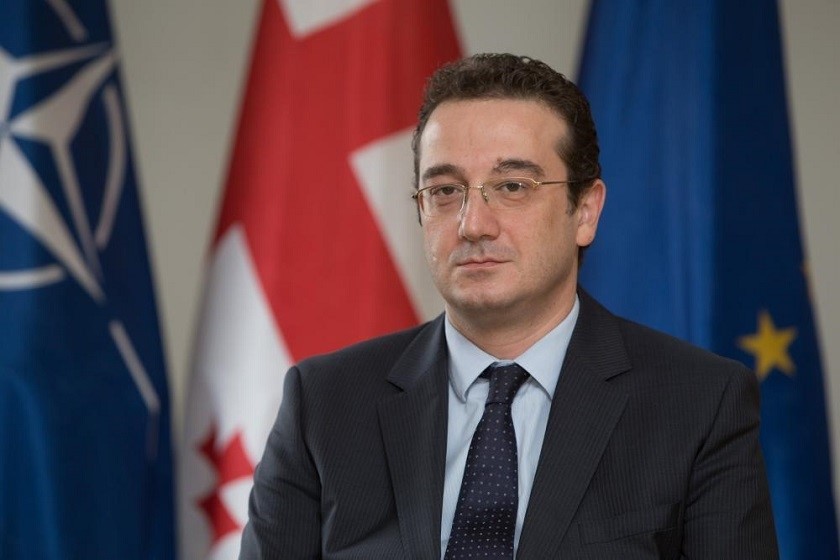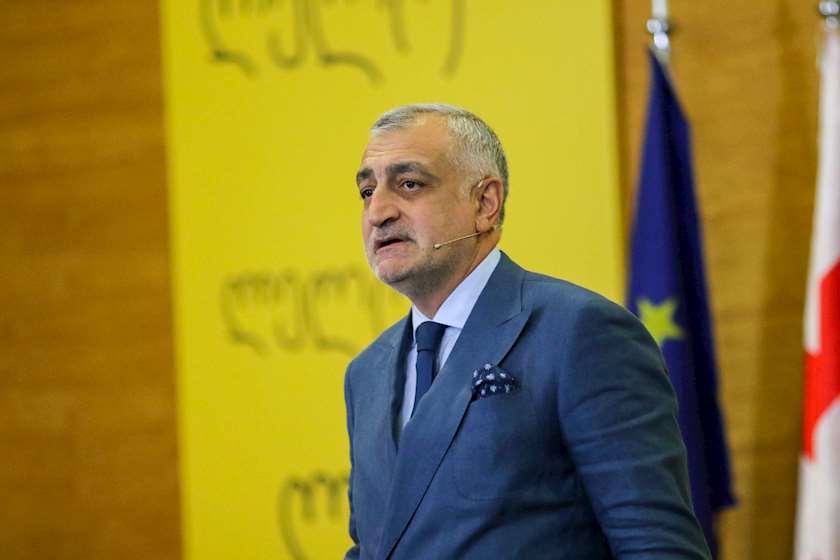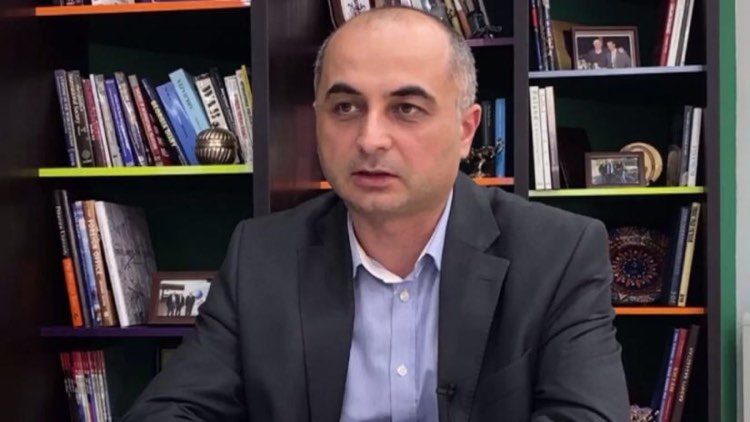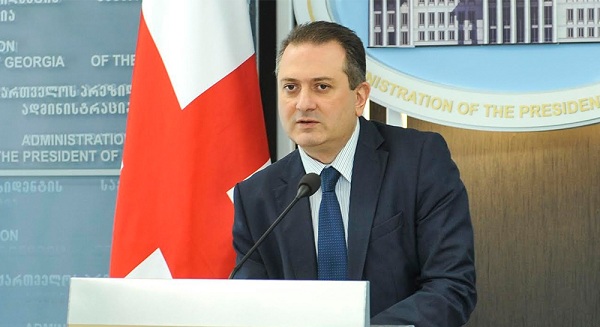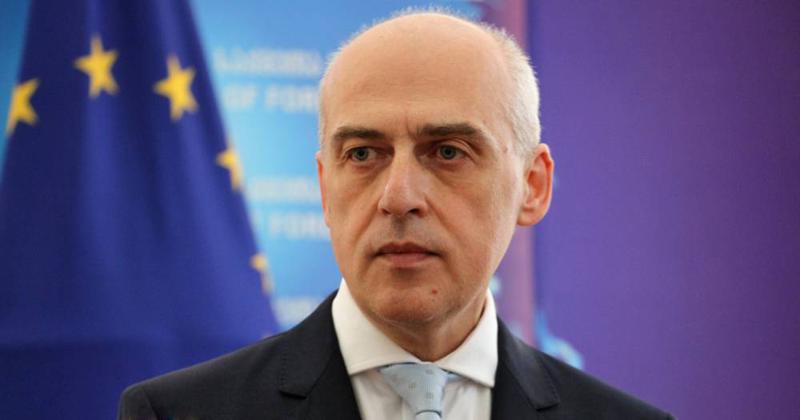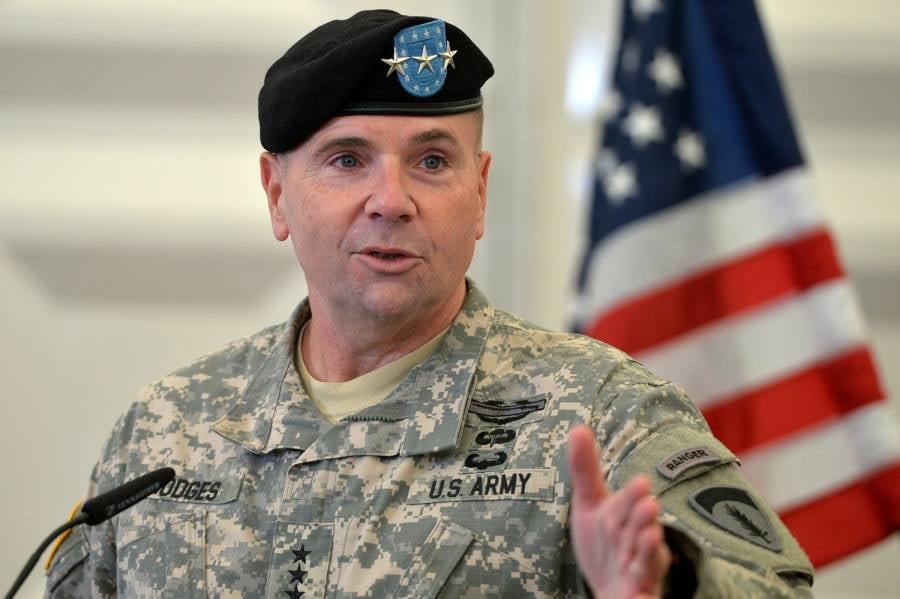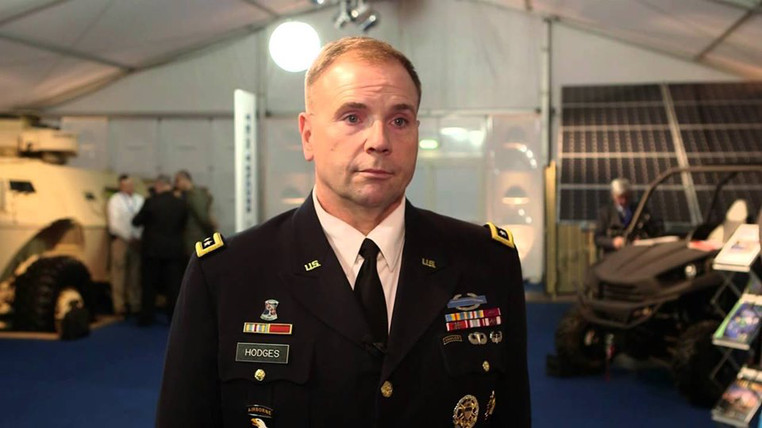Analytics
Bakradze on Hodges: The role of Georgia in the region in terms of Security and Stability is being reaffirmed
„Georgia's role in the region in the direction of security and stability is being affirmed“,David Bakradze, Georgia’s Ambassador to the United States said while answering questions posed by reporters at the Tbilisi International Airport. When asked whether the conversation at the meeting referred to the issue which was discussed by former US military Chief of Staff,General Ben Hodges with „EuropeTime“, Bakradze answered that Georgia had an action plan and the plan entails Georgia’s self-defence ability. „We signed a memorandum with the United States in 2016 on defense and security issues. In 2017, we signed a program to strengthen Georgia's defense, within the framework of which we have an action plan, which we are constantly updating and within which Georgia is approved. Georgia's role in the region in terms of security and stability is confirmed, Georgia's compatibility with the Alliance is also confirmed. These are the directions we will discuss“. David Bakradze clarified. General Hodges,had mentioned in an interview with our publication, that it would be good if the US increased infrastructure and rotational forces in Georgia.
Khazaradze on Hodges: deployment of US military bases will be an inevitable and bold move
„I fully agree with General Hodges opinion, it will be crucially important for our country, especially with the looming consequences. We have to work in this direction”,Mamuka Khazaradze said in a publication available on experti.ge In the interview, Khazaradze mentioned that the urgent deployment of US military bases will be an inevitable and bold move. „For thirty years, one of the biggest allies, friends, and strategic partners of Georgia has been the United States. America has provided the greatest financial investment and humanitarian assistance to our country these past decades. In addition to these, the development of Georgia’s democracy remained the main direction for the relations between Georgia and the US. Unfortunately, during the current government, this partnership was weakened by Tbilisi, but Washington's position remains firm to help Georgia in its Euro-Atlantic integration, as Mike Pompeo confirmed on the very first day of his visit to Tbilisi“. He also stated that the situation in the Caucasus region changed drastically because of the Nagorno-Karabakh conflict and that Russian presence in the region has grown stronger. For Khazaradze, Pompeo’s visit is a visual statement of fact that the USA is equally concerned with moves in the Caucasus region.Prior to Mike Pompeo’s visit, General Hodges, in an interview with „EuropeTime“, said that it would be great if the United States increased its infrastructure and rotational forces in Georgia.
Hodges' call on the US to increase infrastructure and rotational forces in Georgia will lead to a logical decision - Zurab Batiashvili
The United States Secretary of State, Mike Pompeo does not have a scheduled meeting with Turkish State officials. This was made known at a briefing by State Department officials on the US secretary of State’s visit. „After France, Pompeo will visit Turkey, where he’ll have a brief visit and an opportunity to meet with His All-Holiness the Ecumenical Patriarch of Constantinople Bartholomew I. He will also meet with the apostolic nuncio to Turkey, Archbishop Paul Russell, and tour the Rustem Pasha Mosque. Secretary Pompeo is going to use these opportunities to discuss religious issues and, as you know, promoting the unalienable human right of religious freedom and fighting religious persecution is a key priority for the administration and for Secretary Pompeo. He’ll also of course in all the stops have an opportunity to meet with our ambassadors and staff from our missions, embassies, and in Istanbul the consulate general”, - State Department officials announced at the briefing. Political experts believe that the visit of the US Secretary of State is an interesting one, particularly if one considers the list of countries included in this tour. As we know before arriving in Georgia, Pompeo will be visiting France and Turkey. Israel, the UAE, Qatar and Saudi Arabia are lined up next after Georgia. "EuropeTime" spoke to ZurabBatiashvili, an expert and researcher at the Rondeli Foundation about Mike Pompeo’s visit, and other issues centered on the Karabakh and the new reality in the region: It is important to note the significance of Joe Biden’s emergence as President-elect of the United States. When Biden served as Vice President of the United States, he dealt directly with many issues, and even during his recent electioneering, Biden made statements that does not indicate a good development in Turkish-American relations. Now, if you consider the fact that an American high-ranking official is visiting any country, and there are no officials to meet him, you would understand that this signals a really unprecedented move from Turkey. One after the other, these movesraiseanticipationsof the possibility of further strains on the relations between the two countries. Pompeo’s visit is scheduled at a time when conflicts within the Caucasus are extremely tense, as the second war in Karabakh just ended. These conflict are in fact, signs of Russia’s re-emergence on the scene. Relocating US military components or even re-establishing them will be an appropriate response to the situation since it is not possible to tea up with NATO. Without these support, the situation will spell doom for Georgia and every action we take in pursuit of Europe might be in vain. _The fact that two leaders are unable to meet, may shed some light on the attitude and relations between both countries. What are the fundamental issues upon which the non-alignment of the USvisions and Turkey’s interests rest and cannot be reconciled? There are too many fundamental issues between Turkey and the US and the difference in their visions stem from these fundamental issues. These differences have been in place even before the fall of the Soviet Union, but Turkey did not pose a threat of the similitude of the Soviet Union. Following the fall of the Soviet Union, Turkey started handling politics independently, slowly but distinctly, and this was even more noticeable during Erdogan’s reign. Now, when we talk about Turkey-America, we talk about the differences between them, and this begins with the Syrian conflict. Turkey supports the opposition, but the Americans support the pro-Kurdish forces, which Turkey views as a terrorist organization and a threat to itself. The same is with Syria and with Greece as well, where the EU and USA both support Greece. There are also similarities, when we take a look at the purchase of the Russian S-400, Turkey was officially kicked from the F-35 program, a modern fighter jet, which Turkey was intending to buy. Turkey has however developed means to manufacture it and this move has raised sanctions which have already matured in the US Senate. These sanctions stopped Trump from acting for a long time as he had a close and personal relationship with Erdogan. Biden is not going to stop these sanctions, especially since Biden has declared support for Greece and the Syrian Kurds. There are and there will be too many issues in which the visions of the US and Turkey will not coincide. _You stated that the solution will be the re-location of military components to Georgia. A few days ago, General Hodges, in an interview with our publication, said that it would be good if the US increased infrastructure and rotational forces in Georgia. Is this some sort of message before Pompeo's visit, especially in light of the new reality in Karabakh? Even in America, Georgia’s needs are clear and inevitable. When such reasoning begins, it means that the situation is maturing and they may have come to some decision. It may not be NATO, but it may result in the deployment of a US base in Georgia. The deployment of some military contingent, or some components, which are included in the security guarantees is bound to happen. If there is an American base here, it will be a huge factor for Russia. _What impact can the new reality in Karabakh have on Georgia's transit potential? The new reality will impact transit potential, but only slightly. The road that is being discussed between Nakhichevan and Azerbaijan does not even exist yet, because it first needs to be designed. The second issue is how Armenia and Russia are willing to agree. On one hand, we have Russia’s agreements, and on the other hand, we have Russia’s fulfillment of the agreement. If this is the way to connect not only Nakhichevan and Azerbaijan, but also Turkey and Azerbaijan, with Turkey, and with the rest of the Turkish world, I doubt Russia will agree to that. Russia has lots of ways to disrupt this process and there is a possibility that money and resources spent there will be wasted.
Tengiz Pkhaladze: Hodges'message is a timely topic for expert circles prior to Pompeo's visit
Prior to Mike Pompeo's visit to Georgia, an interview granted by Lieutenant General Ben Hodges, Former Commander of the US Army to “EuropeTime” has been the main topic of discussion in the media.Several experts consider Ben Hodges' statement on increasing the infrastructure in Georgia as a timely emphasis. “EuropeTime” also spoke to TengizPkhaladze, an Associate Professor at The Georgian Institute of Public Affairs (GIPA). _Can we consider this statement as the main message before the visit of US Secretary of State Mike Pompeo to Georgia?What form do you think discussions on the strengthening of the infrastructure in Georgia can take? Generally,the increase of Infrastructure in Georgia is in our country’s strategic interest, so let’s not hinge this on the American infrastructure alone.We need to strengthen our infrastructure, which can be important and interesting for our strategic partners. Many things should be considered here, but our ports are of special importance and in this context, the Anaklia project should not be suspended as it is even more important in light of recent developments. The Anaklia project amplifies Georgia’s importance for the East-West corridor. So, the Anaklia project, and every other project, which are in the center of attention including from our US partners should be strengthened”. _Tengiz Pkhaladze strongly hopes that the Anaklia project will be revived soon. “The Secretary of State has repeatedly mentioned the importance of this port. We just have to remember again that, although USA talks about it, it doesn’t mean it should be an American port. It is a Georgian port and we have established this before now. The Anaklia port will strengthen Georgia and the US is ready to help. So, we have to consider that it is firstly in our strategic interest and then, in the interest of our partners. Ben Hodges speaks of the need to strengthen civilian as well as military infrastructure in Georgia - in this context, it is important that our path and strategic choice is towards a North Atlantic Alliance. Georgia is a country that aspires to NATO, and does a lot for it. “It is crucially important for us to have Infrastructure, that will be suitable, at this point, for the alliance.This will firstly increase our security and defensive ability and for this, it is important to use a multifaceted format, which includes Georgia-NATO relationship and Black Sea Security Program, alongside other bilateral relationships, specifically, between the US and Georgia in the field of defense and security”.TengizPkhaladze explained further. Pkhaladze also commented on Hodges's message and explained that, "Before Pompeo's visit, we should consider the interesting pieces of advice from the expert community, who are of course abreast of the security situation in Georgia,and the position of the Black Sea and Europe. They must have also considered Georgia’s role in the big picture, and their deep understanding of the US’ national interests.In fact, this is a very timely focus for those in the analytical circles, and it would be good if they pay attention to it and try to use and sell it as much as possible”. It is also important to discuss the expectations from Mike Pompeo's visit, but, we can only assume that the two topics which will be of utmost importance on Pompeo's visit are: 1. The context of security in our region and in this context, the huge significance of Georgian-American relations. 2. The democratic development of Georgia as this is the central topic upon which our relations are premised. “It is not only important for us to remember what we should expect, but it is equally important for us to envisage what we can offer, what sort of initiatives our government should have, and the kind of visions behind these initiatives. There are some comments that are focused on Pompeo being the Secretary of the outgoing administration, but we shouldn’t examine these issues from that angle, as American politics works differently. We should always remember that inheritance is crucial to politics of the USA”. It is public knowledge that the last country where Pompeo would stop on his visit to Europe will be Georgia, before the Secretary of State will proceed to Israel. “Clearly, the emphasis of Pompeo’s visit will be made on security issues and the main focus will be Middle East and Asia, but,given the events which have taken place in our region, it is understandable that Pompeo plans to stop his Europe leg of visits in Georgia. These facts once again prove that he is concerned about the safety of our country”. Tengiz Pkhaladze, finally submitted during the interview that NATO integration is a multifaceted format and it does not depend solely on US-Georgia relations, but if Georgia develops bilateral relations and move to another level in the field of security, it will affect Georgia’s NATO integration as well.
Zalkaliani on Hodges: Cooperation on defense and security with the US is very important
„Collaboration with US is crucially important for Georgia in the field of defense and security, otherwise, we will not be able to cope with the security challenges facing our country”. Georgia’s Minister of Foreign Affairs, David Zalkaliani, asserts ahead of the arrival of the US Secretary of State, Mike Pompeo, at the Tbilisi International Airport. He was asked by reporters if the meeting was about the issues raised by the former head of the US military in Europe, General Ben Hodges, when he spoke to “EuropeTime” “Cooperation in the field of defense and security with America is very important and valuable for us.Strengthening our democratic institutions is one of the key areas of strategic partnership cooperation and we are constantly talking about it. Strengthening democratic institutions is an ongoing process”.the minister reiterated. In an interview with our publication, General Hodges said that it would bode well if the US increased its infrastructure and rotational forces in Georgia. According to him, with the help of the Americans, talks on strengthening Georgia will continue. US Secretary of State Mike Pompeo is already in Georgia and he will hold official meetings beginning on November 18.
Ben Hodges: I’d like to see the USA increase its infrastructure in Georgia, especially to support rotational forces and strategic air lift
_Dear General, in your interview regarding the Karabakh conflict, you said that you considered the deployment of Russian peacekeepers in the region to be the worst-case scenario. How will you assess the current situation? I’m glad to see an end to the fighting and killing, especially of civilians. I’m glad that Azerbaijan, with Turkish support, has decided against overreaching. I hope that the agreement will last and that both sides will respect the agreement. But I think there are other nations who could have provided a peace-keeping force instead of the Kremlin. I would consider the Russian forces which are deploying there today to be more like occupiers rather that peace-keepers… similar to what they have in Transdniestra, Abkhazia and South Ossetia. They are actually “piece keepers”. _What changes do you think this will lead to in the region? What will be the influence of Turkey and Russia in the Caucasus, in what ratio and with what perspectives? Turkey has demonstrated an ability to influence its region as well as showcase the high level of modernization of some of its capabilities… And the quality of training and advising it has provided to Azerbaijani Forces. But I can’t tell yet what the long-term implications are for Turkey in the region…They certainly seem to be trending positively at this point from a Turkish perspective. Perhaps Turkey will use this for a responsible, positive approach to improving stability and security in the region… And for doing more to counter Kremlin aggression in the rest of the Black Sea Region. _What fate awaits the important routes and corridors that run through these areas and connect the West and the East with this new configuration?And what will all this bring or change for Georgia as a country with a transit corridor? In general, how does this new 'order' affect it? This is the key strategic question… Will the new circumstances help or hinder development of the Aze-Geo East West corridor that connects Europe and Eurasia… the only such corridor for gas, telecommunication and air travel that doesn’t go thru Russia or Iran. Having Russian ground troops there as occupiers is not likely to be very helpfulThe significance of the Russian bases in Armenia, close to Georgian territory, has gone up and so Georgia and its partners, like the USA, should pay attention to this. I’d like to see the USA increase its infrastructure in Georgia, especially to support rotational forces and strategic air lift, as well as maritime presence… this is part of great power competition…demonstrating that this region is important to us and that we’ll invest in diplomacy, information, and private economic investment as well as continuing security cooperation.
Hodges on Karabakh conflict: “This is potential proxy conflict between Turkey and Russia”
Despite a Russian-brokered truce agreed on October 10, fighting between Armenia and Azerbaijan has continued. Armenia and Azerbaijan have accused each other of violating humanitarian ceasefires in Nagorno-Karabakh. Ben Hodges, former commander of the US Army in Europe hopes that the conflict can be resolved as soon as possible via negotiations. “I hope that the conflict can be resolved as soon as possible via negotiations. This is a potential proxy conflict between Turkey and Russia that needs be resolved. I anticipate that the Kremlin step in soon. And it seems that Turkey is making some sort of agreement with Russia re Turkish troops in Syrian in order to mitigate Kremlin reactions in Nagorno-Karabakh. We are seeing a new development in the use of drones as a key part of warfare. The Armenians seem to be slow in adapting to this. So we are all going to need to pay attention to this and figure out how to take advantage of this technology ourselves and to develop capabilities to counter these capabilities. We also need to develop our capability to avoid detection, not only from visual detection, but also from detection of thermal signature and electro-magnetic signature,” Hodges told the Europetime. As he said, “it is important that Azerbaijan not to overreach so that the Kremlin doesn’t step in.” “But avoiding overreach and hubris is always difficult when things seem to be going well,” Hodges added. As for international involvement in the process, Hodges said that the United States should always step forward to help with conflict resolution. “The United States should always step forward to help with conflict resolution. But we really need to work closely with our allies, especially Germany. Germany is our most important ally and is probably the only government that can influence Kremlin behavior. The U.S. should work closely with Germany on conflict resolution here as well as in the Eastern Mediterranean and in Belarus,” he told the Europetime. According to him, one of the worst outcomes of this entire situation would be Russian “peace keepers” in Nagorno-Karabakh. “This region is key, because it is the only East-West route that bypasses Russia and Iran. So, if Russian “peace keepers” end up there, it could disrupt East-West air traffic, energy distribution and telecommunication routing,” he added. When asked, about major infrastructure projects on the Black Sea in Georgia, such as the port of Anaklia, the construction of the Batumi port terminal (which is carried out by direct investment from the United States) and the Russian resistance to these projects, Hodges said: “Russia does not have right to determine what is best for Georgia. Only the people of Georgia have right to make that decision, regardless of what the Kremlin thinks is best.”


